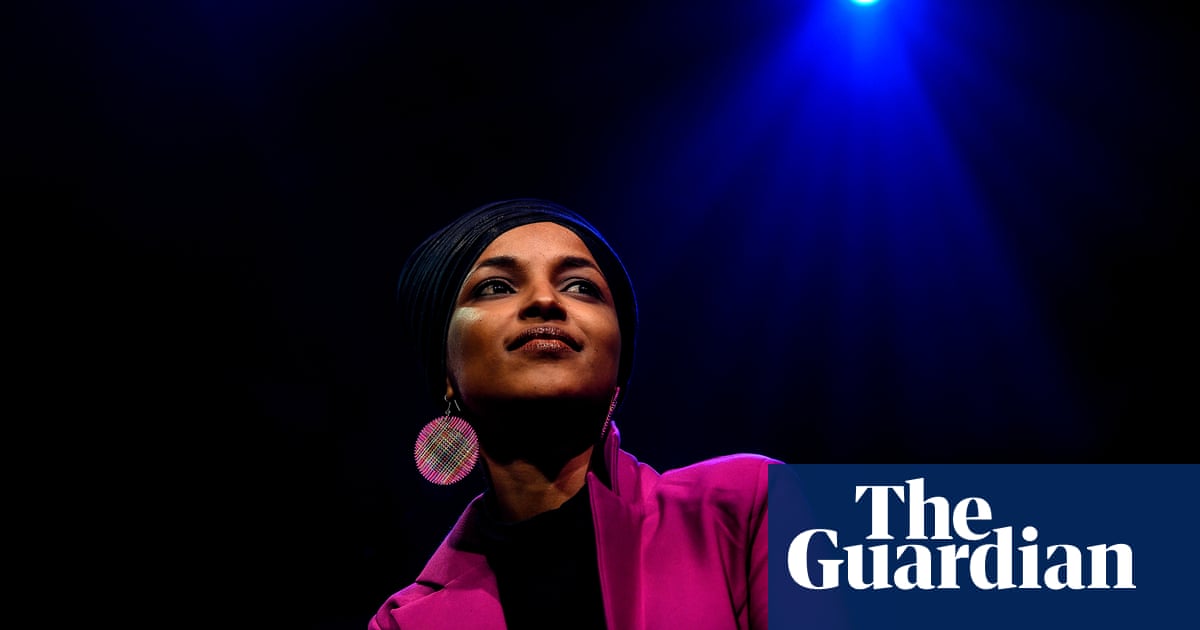
F
ew things are more unexpected than a genuinely inspirational memoir by a freshman member of Congress. If you’re looking for the perfect antidote to the perpetual tweetstorm of insanity and hatred from Donald Trump, try this beautiful new book from the Minnesota congresswoman Ilhan Omar.
This migrant from Somalia came from a family of teachers and civil servants who lived in a guarded compound. Ilhan had a chauffeur to drive her to school. But all of that disappeared when Somalia was engulfed by civil war.
“Bullets flew from one side of the conflict to the other,” Omar writes, “… directly over our house”. The house took direct hits, food became scarce and 350,000 died in the first year of the conflict.
Omar’s family was forced to the oceanside town of Kismayo, where she was told that her father and brothers were dead. But the next day she followed what she thought was her father’s voice, “and toward the end of the stretch where everyone was sleeping, there he was … I put my hand on his face, just to make sure he was real. And he was.” Her brothers were alive, too.
They fled to Kenya, where they faced malaria, dysentery and near starvation. The family survived in a refugee camp for 334,000 people, bartering kidney beans for kerosene and batteries for a radio. When she needed entertainment, Omar snuck under the barbed wire to walk to a nearby village, where an enterprising Kenyan charged a few shillings to watch movies on his TV. When six children who were distant relatives lost both their parents, Omar’s family looked after them, Ilhan paying special attention to the baby, Umi.
Her father discovered that they could apply through the United Nations to go to Norway, Canada or Sweden. But the US was his first choice.
“Only in America you ultimately become an American,” he said. “Everywhere else we will always feel like a guest.”
Miraculously, a year after their first interview they were allowed to apply for America. Ilhan was upset, partly because the orphans couldn’t come with them, but the rest of her book is the astonishing story of a voyage from Nairobi to New York to Minnesota, then barely 20 years later to Congress.
The family’s first stop was Arlington, Virginia, where the combative Ilhan spent most of her time in detention. But then she decided, she writes, “that my education was the one element of my life I had full control over, and given the long hours of studying in detention”, by the time they moved on to Minnesota she “had become a very good student”.
At her new school, “Africans fought African Americans over who was blacker. Muslim kids and white kids fought over US policy in the Middle East. Latinos against African Americans, Africans against Native Americans.”
But Ilhan began to display her talents as a community organizer. She joined a group of students determined to “improve racial and cultural relations” by founding Unity in Diversity, “essentially a training program around diverse leadership”.
Her next stop was North Dakota State University, after a friend told her it was searching for students, offering scholarships and a “very low cost of living”. Back in Minneapolis after graduation, she immersed herself in the Democratic Farmer-Labor party, first working to defeat ballot initiatives to require photo IDs for voters and to outlaw gay marriage.
She figured out a winning narrative: both were threats to freedom and civil liberties, a message that worked with communities of color and white rural Minnesotans. No anti-marriage equality initiative had ever been beaten until then – the same year Barack Obama was elected president.
Omar was elected to the state legislature in 2016, then to the US Congress in 2018, as one of the first two Muslim women in the House. She feared she would be banned from the House floor by an ancient rule barring hats, which would have prevented her wearing her hijab. Nancy Pelosi fixed the rule.
It’s unfortunate that Omar’s greatest fame is from a tweet made after Republican leader Kevin McCarthy said he wanted to punish her for her views on Israel, which include a two-state solution. When she tweeted back about campaign contributions from the Israeli lobby, writing “it’s all about the Benjamins baby”, the Twitterverse exploded.
She realized her mistake and apologized.
“I am by nature a starter of fires,” she writes. “My work has been to figure out where I’m going to burn down everything around me by adding the fuel of my religion, skin color, gender, or even my tone. Knowing not just yourself … but also how the world interacts with you … is vital to true and lasting progress.”
Last week, such fire-starter impulses re-emerged: Omar expressed support for Tara Reade, who has accused Joe Biden of sexual assault. Omar conceded that Reade’s accusations have not been proven, and said she would still vote for Biden for president. But she also said it was “important” to believe Reade just because she describes herself as a “survivor”.
It’s “not my place to litigate her story”, she said.
On the other hand, there is another thing that makes Omar the perfect member of Congress for this moment.
“Recognizing my psychology as a refugee who has seen her home devolve in to chaos basically overnight,” she writes “… it’s my duty to call out the lack of awareness about the disintegration of civilization that is possible anywhere … it can happen only when nobody is paying attention … or people stop caring.”
When Omar was sworn in to Congress, there was one more big surprise. She had never believed Umi, the baby from the refugee camp, would make it. But now “a beautiful … vibrant, smiling woman” was standing in front of her.
“I’m the baby,” Umi said.
The congresswoman started to cry.



